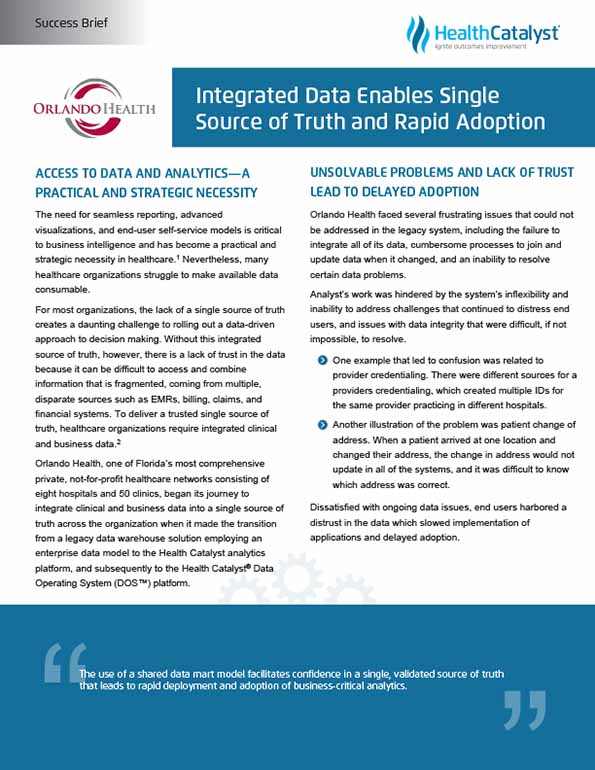The need for seamless reporting, advanced visualizations, and end-user self-service models is critical to inform decision making. Learn how Orlando Health leveraged its analytics platform and applications to provide users with a data model that could enable a single source of truth for data-driven decision making.
The need for seamless reporting, advanced visualizations, and end-user self-service models is critical to business intelligence and has become a practical and strategic necessity in healthcare.1 Nevertheless, many healthcare organizations struggle to make available data consumable.
For most organizations, the lack of a single source of truth creates a daunting challenge to rolling out a data-driven approach to decision making. Without this integrated source of truth, however, there is a lack of trust in the data because it can be difficult to access and combine information that is fragmented, coming from multiple, disparate sources such as EMRs, billing, claims, and financial systems. To deliver a trusted single source of truth, healthcare organizations require integrated clinical and business data.2
Orlando Health, one of Florida’s most comprehensive private, not-for-profit healthcare networks consisting of eight hospitals and 50 clinics, began its journey to integrate clinical and business data into a single source of truth across the organization when it made the transition from a legacy data warehouse solution employing an enterprise data model to the Health Catalyst analytics platform, and subsequently to the Health Catalyst® Data Operating System (DOS™) platform.
Orlando Health faced several frustrating issues that could not be addressed in the legacy system, including the failure to integrate all of its data, cumbersome processes to join and update data when it changed, and an inability to resolve certain data problems.
Analyst’s work was hindered by the system’s inflexibility and inability to address challenges that continued to distress end users, and issues with data integrity that were difficult, if not impossible, to resolve.
Dissatisfied with ongoing data issues, end users harbored a distrust in the data which slowed implementation of applications and delayed adoption.
Orlando Health has recently migrated to the new DOS platform as the foundation for its data-based technology. DOS is a data-first, analytics and application platform that transforms raw data from virtually any data source into “deep data”—data that is meaningful and actionable, leading to actual business value at a lower cost. DOS accomplishes this by integrating and analyzing critical data from over 200 of the most widely used data sources, and delivering real-time decision support.
Shared data marts are a key component of DOS that allow sharing of data, aggregation, and calculations to be done between Source Marts. The use of a shared data mart model facilitates confidence in a single, validated source of truth that leads to rapid deployment and adoption of business-critical analytics.
Orlando Health implemented the SharedClinical and SharedPerson shared data marts, loading ten sources worth of data into the platform in under six months. These shared data marts provide a single source of truth that allows a system level view into various records and reports.
Colocation and aggregation occur in the same shared data marts which dispels confusion when the same data element appears more than once. Analysts can easily identify and resolve data issues that were unsolvable in the past. There is a high level of confidence in the data being pulled in through SharedClinical, and end users believe in the accuracy of the data and the results, which inevitably leads to faster implementation and adoption.
Integrated data and ability to deliver superior solutions has resulted in a single source of truth, leading to increased adoption. Once customers realized the timeliness, ease of access, and quality of the improved analytics and visualizations available to them, demand and adoption increased and continues to grow.
In addition, as a result of the analyst’s ability to quickly solve problems, reduce queue time, and deliver quality solutions, their job satisfaction has improved.
Orlando Health looks forward to increasing adoption of its self-service model, driven by demand for easily accessible analytics, leveraging integrated sources of data as the key to a single source of truth.


